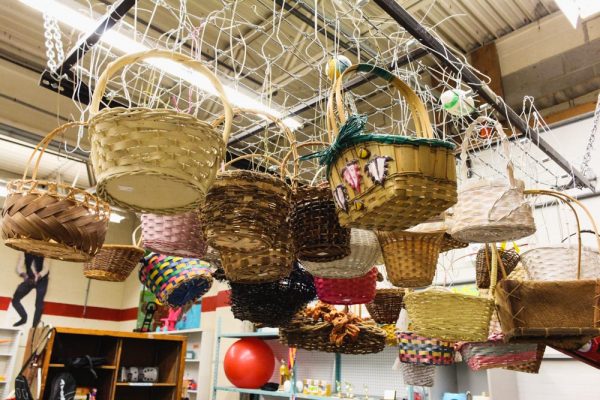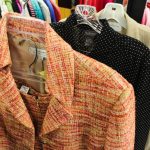
Woven baskets hang on display in the Ann Arbor PTO Thrift Shop. Melissa Workman | Washtenaw Voice
By Claire Convis
Deputy Editor
Thrift shopping is more prevalent in my life than grocery shopping. For as long as I can remember, I’ve found treasures at Salvation Army, Goodwill, Habitat for Humanity, and other resale locations. Not only is thrift shopping fun and affordable, it’s also good for the environment.
Paulette Brown is the general manager of the Ann Arbor PTO thrift shop, a nonprofit store with a goal to support the community. Brown is going into her 11th year at PTO and the store is going into its 27th year.
“One of the things that we put in our hashtag is “resale is recycling.’ In our case, as a thrift shop, we’re a nonprofit that has a mission,” said Brown.
“Everything that’s donated past our expenses goes back to our mission, which is the Ann Arbor public school students and their extracurricular activities,” Brown said.
Often, programs or clubs are pulled from schools because of state budget cuts, said Brown, and the PTO thrift shop helps contribute to keeping those activities available to students.
“So why should people shop at a thrift shop?” said Brown. “They are giving things that are not past their useful life a chance to be useful again.” Brown said that the items and antiques at a thrift shop can be more unique than what you would find at a typical store.
Excess clothing donations and unsellable items are recycled, Brown said. “It’s not getting put into the waste system.”
Thrift shops such as PTO are ideal for shoppers who enjoy thrifting as a personal choice, and also for those whose economic circumstances drive them to seek out affordable prices, Brown said.
“We’ve got such a following, and so many people believe in our mission, that we’re very blessed with the quantity of things we get, and the quality,” said Brown. “We have so many well-trained staff and volunteers.”
Smita Malpani, a professional environmental science faculty member at WCC, said there’s an environmental benefit to shopping secondhand.
“There’s an enormous footprint to the clothing that you and I wear,” said Malpani, citing the land, water and pesticides that go into growing cotton and other materials.
“If you wear something for a few times and if instead of throwing it away, you pass it on to the next person, what does that do?” said Malpani. “It makes clothing accessible for people that might not otherwise be able to afford it, and I think that’s super important.”
Malpani also said resale shopping cuts down on the demand for new clothing to be manufactured, therefore reducing our footprint on the environment.
Although cotton, wool and silk are biodegradable, they contribute to the methane levels released from landfills. And clothes made from plastic sit in landfills forever, Malpani said.
“They become part of the tecno fossil period of our earth… if societies are to look back on our earth 10,000 years from now… what will they see from our fossil record? They’ll see a bunch of plastic debris,” Malpani said.
- Used books for sale at the PTO Thrift Shop. Buying used helps reduce waste. Melissa Workman | Washtenaw Voice
- An assortment of dresses for sale at the PTO Thrift Shop . Melissa Workman | Washtenaw Voice
- An assortment of baby clothes hang in PTO Thrift Shop. Melissa Workman | Washtenaw Voice
- A collection of board games for sale at the PTO Thrift Shop. Melissa Workman | Washtenaw Voice
If you’re feeling like cleaning out your closet, you can donate your old clothes, accessories, toys, books, movies and even furniture.
“I think there’s a way we can all live with less,” Brown said.
It might not be as glamorous to shop secondhand instead of buying new clothes and items, but it’s important that we all do our part to cut back on our impact on the earth. And not only will you save money and discover unique finds, but it feels good knowing that you’re making a difference.
“Thrift shopping is a different experience because you can find certain treasures,” said Hannah Warthman, who is a 19 year old WCC student studying elementary education. “And you can find name-brand stuff that’s discounted.”
There’s also a sense of community that is created through the recycle and resale of goods.
“We’re contributing to less of a selling economy and more of a sharing economy,” Malpani said.
Next time it’s time to buy new clothes, books or other items, consider visiting your local thrift store first.





